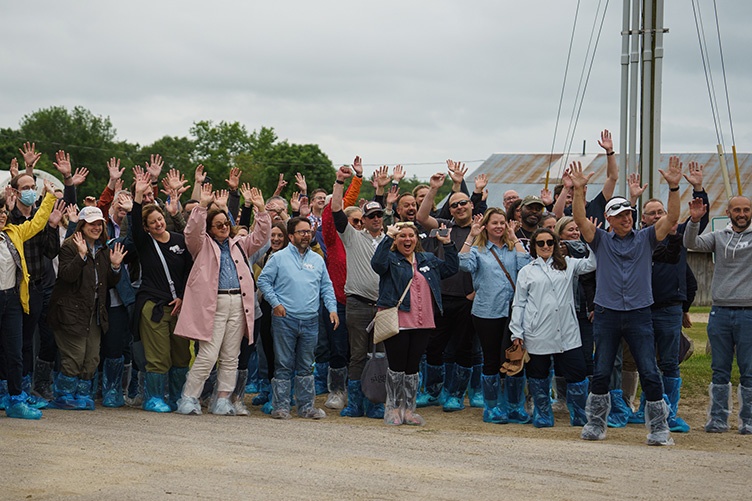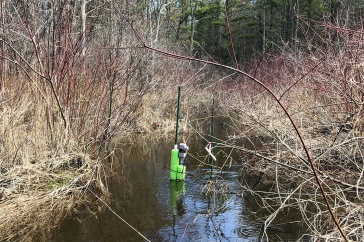
Members of the Stonyfield Organic sales and marketing team recently visited the UNH Organic Research Dairy Farm to learn about the operation and research projects firsthand.
In September 2025, the Organic Dairy Research Farm at the University of New Hampshire (UNH) began shipping milk directly to the Stonyfield Organic processing facility in Londonderry, New Hampshire, a move that will further strengthen the more than 20-year partnership between the New Hampshire based company and the state’s land-grant university. The recent direct marketing agreement is also intended to reinforce the mutual goal set in 2005 to support local farmers, processors and regional food systems through research and hands-on workforce development.
“About 20 years ago, Stonyfield Organic provided support for the Organic Dairy Research Farm that was essential for moving it from concept to reality,” says Anthony S. Davis, dean of the College of Life Sciences and Agriculture at UNH. “We’re delighted to further strengthen our close relationship, as the dairy serves as a critical source of research that informs New Hampshire farmers and provides a learning platform for our students.”

Sciences and AGriculture, Addresses visitors
from StonyField organic.
While the UNH Organic Dairy Research Farm (ODRF) is the closest milk producer to the Stonyfield processing facility, the partnership is enduring and multi-faceted, extending far beyond geographical proximity. Stonyfield’s mission—to support and promote organic dairy farming—predates its successful yogurt business.
“Organic dairy farming has become a very meaningful proportion of the northeast dairy marketplace over the past four decades,” says Stonyfield Organic Co-Founder and longtime former CEO Gary Hirshberg. “For instance, organic dairy farms comprise a quarter of Vermont’s dairy farms and one-third of Maine’s. And many observers believe that it is the only long term economically sustainable way to keep our region’s family farmers in business. But despite the success of the rapidly growing sector, organic farmers still face a variety of challenges.”
Identifying and helping overcome those industry challenges through discovery, innovation and workforce development are precisely the mission of the ODRF. Spanning 275 acres in Lee, New Hampshire, the farm includes approximately 100 Jersey cows, barns, milking parlor, crop and forage fields and pastures, and woodlands —all components of a typical Northeast small grazing and organic dairy operation. What is different is the daily bustle of scientists, graduate and undergraduate students, operations staff, and industry and public visitors, all focused on developing, supporting and learning about locally inspired science.

UNH's Organic Dairy Research Farm has begun shipping milk directly to the Stonyfield Organic processing facility in Londonderry, New Hampshire, strengthening a partnership forged more than 20 years ago and contributing to the support of local farmers, processors and regional food systems through research and hands-on workforce development.
Research and operations at the ODRF, which are supported by the NH Agricultural Experiment Station, focus on dairy nutrition, precision dairy management, pasture quality, forage production, agroforestry and natural resource management, including streams and woodlands, with impacts relevant for both organic and conventional small-scale dairies. The goal is to test new technologies and reduce innovation adoption risks for farmers and landowners in New Hampshire and beyond.
It is this mutual mission to elevate New England’s regional food system that makes the UNH and Stonyfield partnership so strong.
“The ODRF provides absolutely essential data and guidance for the best and most economically sound organic practices that are key for northern New England organic dairy farms,” adds Hirschberg. “Our support of the ODRF in turn supports the community of organic farmers and farming operations across the region on which we depend to produce our rapidly growing market-leading yogurts and other dairy products.”
The long-term vision is that the direct marketing agreement serves as a catalyst for building a stronger private–public partnership over the next 20 years. One goal would be to leverage the close proximity of the ODRF and Stonyfield to create hands-on opportunities for UNH students and researchers and for Stonyfield employees to deeply understand the scope and nuances of New Hampshire’s food supply chains, from animal management to milk production, value-added processing, and marketing a final product. The partnership will enable UNH to make a greater impact on developing the most relevant science and on training a highly knowledgeable workforce for New Hampshire.

into organic feed supplementation to reduce
methane emissions and improve cow health.
"Stonyfield has stayed connected to our work from the very beginning, and now, with our direct supply relationship, the partnership takes on a deeper significance," says Jason Scruton, ORDF farm manager. "It’s exciting to see our growing partnership with Stonyfield help turn our ongoing research into real-world impact, as they share what we’re learning with their direct supply farms and the wider organic dairy community."
Founded in 1887, the NH Agricultural Experiment Station at the UNH College of Life Sciences and Agriculture stewards federal and state funding to scientific discovery and innovation to benefit New Hampshire’s agricultural, food, forestry and natural resources sectors and communities. The Station supports over 50 research projects that focus on locally inspired challenges and provides oversight and operations to UNH’s agricultural and forestry facilities and lands.
Stonyfield Organic began selling yogurt in 1983, using milk produced by seven cows on an organic farming school in rural New Hampshire. The yogurt, made without the use of toxic pesticides or chemical fertilizers, was an immediate success, and today Stonyfield Organic yogurts, smoothies, milk and cream are sold throughout the United States. Stonyfield has always been passionate about planet-friendly business practices, and in 2016 it became a certified B Corporation, validating its high standard of verified social and environmental performance, public transparency and legal accountability. In 2022, Stonyfield Organic achieved its goal of using 100% renewable energy at its Londonderry manufacturing facility.
















































